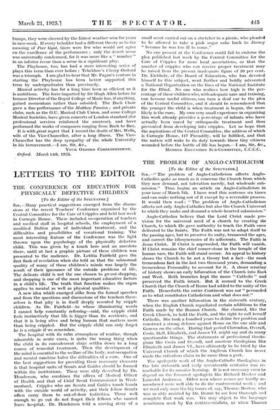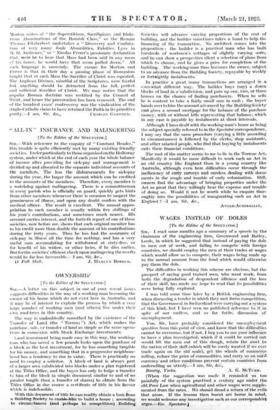THE PROBLEM OF ANGLO-CATHOLICISM
[To the Editor of the SPECTATOR.] SIR,—" The problem of Anglo-Catholicism affects Anglo- Catholics quite as much as it concerns the Church from which they now demand, not toleration merely, but wholesale sub- mission." Thus begins an article on Anglo-Catholicism in your issue of March 7th. I have read this sentence six times and can make nothing out of it except by a reversible process. It would then read : " The problem of Anglo-Catholicism affects not only Anglo-,Catholics but also the Church Universal to which they.make and demand a whole-hearted submission." . Anglo-Catholics believe that the Lord Christ made pro- vision for the universal need of a church by creating the Church, to which He gave authority to teach the Faith once delivered to the Saints. The Faith was not to adapt itself to the passing ages, but to preserve its unity, transcend the ages, and correct the idiosyncrasies of its -adherents. The Faith is Jesus Christ. If Christ is superseded, the Faith will vanish. If Christ remains the chief corner-stone in the temple of the human race, the Faith will stand secure. An appeal to history shows the Church to be not a theory but a fact—the most tremendous fact in the last two thousand years, demanding a tremendous Personality to account for it. A closer scrutiny of history shows an early bifurcation of the Church into East and West. Both branches kept the name " Catholic " and preserved the Faith intact. But it seemed to the Greek Church that the Church of Rome had added to the unity of the Faith. Henceforth the entire Continent was not " persuaded as to what constitutes Catholicism and what does not."
There was another bifurcation in the sixteenth century, when the English Church repudiated certain additions to the Faith made by the Roman Church. She claimed, like the Greek Church, to hold the Faith, and the right to call herself Catholic. She took a hundred years to define her position and construct a strong defence against Rome on the one side and Geneva on the other. During that period Clarendon, Overall, Cosin, Hall, Elizabeth, and James VI. might say and do many questionable things. The statements of professional theolo- gians like Cosin and Overall, and amateur theologians like Elizabeth and James VI., have ultimately to be tried by the Universal Church of which the Anglican Church has never made the ridiculous claim to be more than a part.
The apologetic work of the Anglo-Catholic theolvians in the late sixteenth and early seventeenth centuries was re- markable for its massive learning. It is not necessary even to
depend on the foremost apologists like Richard Hooker and Lancelot Andrewes. Other men whose names are hardly re- membered were well able to do the controversial work ; and we need only scan the big tomes of, say, Thomas Morton; who was so ably assisted by Dr. DOnne to see how thorough and complete that work was. We may object to the language sometimes used by the contrcversialists, as when Thomas Morton writes of " the Superstitious, Sacriligious, and Idola- trous Abominations of the Romish -Class," or the Roman Thomas Fitzherbert undertakes a " Discovery and Confuta- t ion of very many foule Absurdities, Falsities, Lyes in M. D. Andrewes," or " Nicolas Ferrer's passionate declaratiOn that, were he to hear that Mass had been said in any room °Nils house, he would have that room pulled down." All such language is unseemly. The excuse. for Morton. and Ferrer is that in their day a passing phaSe of Romanism taught that at each Mass the Sacrifice of Christ was repeated. The Anglican Divines, mindful of the Scripttires, were fearful lest anything should be detracted from the full, perfect and sufficient Sacrifice of Christ. We may notice that the popular Roman doctrine was rectified by -the Council of Trent, and hence the provocation has been removed. The end of the hundred years' controversy was the vindication of the Anglo-Catholic claim to have retained the Faith in its primitive purity.—I am, Sir, &c.,CHARLES G .
ARDNER.























































 Previous page
Previous page